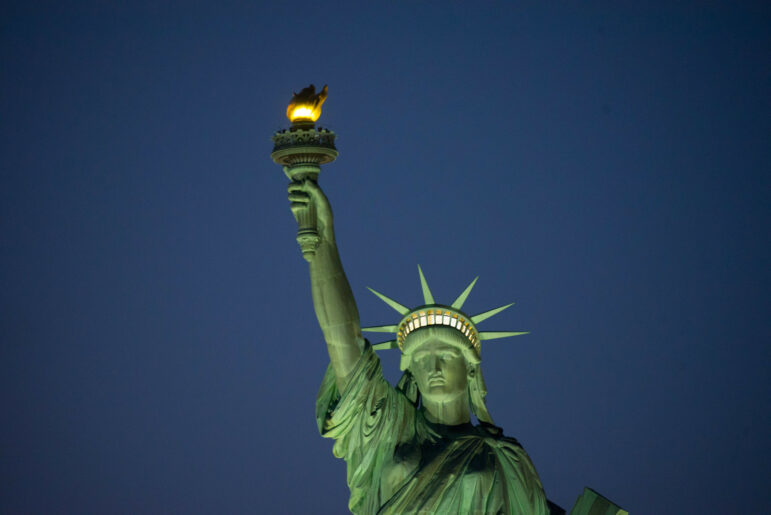“It’s important that we raise attention to the issue of statelessness. That’s why women like me are going public with our stories. We need more people to understand that this is an urgent issue. It keeps us from moving on and living productive lives in the U.S. and we’re always anxious about what might happen.”

Michael Appleton/Mayoral Photography Office
The Statue of Liberty.I’m a New Yorker, to the core. I grew up in Brooklyn in the late 1990s and early 2000s. I know not to eat pizza with a fork. When you hear me talk, I sound like a New Yorker. I say things like, “it’s brick outside,” when it’s freezing. Where others may walk miles to find a store, I prefer to go to the bodega right next door. If I give people directions, I’ll tell them how many blocks.
Now I live in Washington Heights and work in e-commerce. I pay taxes. There’s something you wouldn’t know about me, though, from meeting me. I was born in Kuwait. My parents came here when I was a little girl aged four. And even though I’m married to a U.S. citizen, and had an all-American upbringing, I’m “stateless.” Being stateless means you don’t have citizenship from any country in the world. Often people say it’s like being a “citizen of nowhere.”
It’s International Women’s Day on Wednesday and a good time for me to talk about my statelessness. That’s because 162 countries around the world don’t offer “birthright citizenship.” I was born in Kuwait and my mother is a Kuwaiti citizen, but my father is not. Only men can pass on their citizenship in Kuwait, not women. More than 20 countries do this kind of gender discrimination. So, I became stateless. I know. It’s 2022. But we still have this problem. And it’s time for the U.S. to fix it for people like me.
Statelessness has major consequences for people’s human rights. Immigration and Customs Enforcement (ICE) detained me when I was 15. They took me to a facility in Queens where they strip-searched me. They came to my house at 6 a.m. when I was about to go to school. They handcuffed me and put me in a truck. They detained me for six months but in the end, they released me because there was nowhere to deport me to.
Every year I have to report to the same immigration authorities that detained me. We shouldn’t treat any girl in New York like this. It’s un-American. I kept saying to them, “You’re treating a child like this?” It goes against all the values I hold dear, and which I’ve absorbed growing up in New York, a beacon of freedom. When they detained me, I realized I needed to push for a resolution to the issue of statelessness.
That’s why I co-founded an organization called United Stateless. It’s a movement in the United States calling for an end to statelessness. There are about four million stateless people around the world. We all have our own stories. But there are 200,000 of us in America. Some of us have families that fled violence or persecution. Some of us are holocaust survivors. Being stateless exposes us all to the risk of exploitation and is a breach of our human rights. The United Nations Universal Declaration of Human Rights say every person has a right to a nationality. Yet many of us here in America still lack that basic human right.
The good news is that two members of Congress have introduced a bill that might fix things: U.S. Sen. Ben Cardin and Rep. Jamie Raskin’s Stateless Protection Act would create a new protected status and pathway to citizenship for people like me. The Biden administration has also made some promises. But stateless people are still waiting for those to come good.
Meanwhile, it’s important that we raise attention to the issue of statelessness. That’s why women like me are going public with our stories. We need more people to understand that this is an urgent issue. It keeps us from moving on and living productive lives in the U.S. and we’re always anxious about what might happen.
Danah Abdulaziz is a co-founder of UnitedStateless.org. She lives in Washington Heights.








